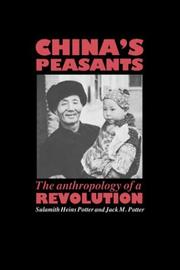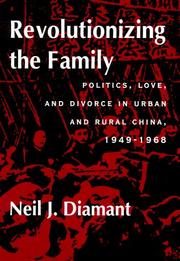| Listing 1 - 8 of 8 |
Sort by
|
Book
ISBN: 0140215700 Year: 1972 Publisher: Harmondsworth, Middlesex [etc.] : Penguin Books,
Abstract | Keywords | Export | Availability | Bookmark
 Loading...
Loading...Choose an application
- Reference Manager
- EndNote
- RefWorks (Direct export to RefWorks)
Multi
ISBN: 2070296520 9782070296521 Year: 1982 Publisher: Paris: Gallimard,
Abstract | Keywords | Export | Availability | Bookmark
 Loading...
Loading...Choose an application
- Reference Manager
- EndNote
- RefWorks (Direct export to RefWorks)
Chinese --- China --- Social conditions --- Case studies --- S06/0435 --- China: Politics and government--Cultural Revolution --- Chine Histoire +* 1949 - 1976 + (Mao-Tse-Toung) --- Chine Moeurs et coutumes Récits personnels --- Chinese - China - Hong Kong - Interviews --- China - Social conditions - 1949-1976 - Case studies

ISBN: 052135787X 0521355214 0511607784 Year: 1990 Publisher: Cambridge Cambridge University press
Abstract | Keywords | Export | Availability | Bookmark
 Loading...
Loading...Choose an application
- Reference Manager
- EndNote
- RefWorks (Direct export to RefWorks)
This landmark study of Zengbu, a Cantonese community, is the first comprehensive analysis of a rural Chinese society by foreign anthropologists since the Revolution in 1949. Jack and Sulamith Potter examine the revolutionary experiences of Zengbu's peasant villagers and document the rapid changeover from Maoist to post-Maoist China. In particular, they seek to explain the persistence of the deep structure of Chinese culture through thirty years of revolutionary praxis. The authors assess the continuities and changes in rural China, moving from the traditional social organization and cultural life of the pre-revolutionary period through the series of large-scale efforts to implement planned social change which characterized Maoism - land reform, collectivization, the Great Leap Forward, and the Cultural Revolution. They examine in detail late Maoist society in 1979-80 and go on to describe and analyse the extraordinary changes of the post-Mao years, during which Zengbu was decollectivized, and traditional customs and religious practices reappeared.
Communism --- S20/0700 --- History --- China: Agriculture forestry, fishery, natural disasters--Communist land reform and agrarian policy --- China --- Rural conditions. --- Social conditions --- History. --- Peasants --- Agriculture --- Paysannerie --- Histoire --- Chine --- Rural conditions --- Conditions rurales --- 1949 --- -Communism --- China - Rural conditions. --- China - Social conditions - 1949 --- -Communism - China - History. --- Social Sciences --- Anthropology
Book
ISBN: 2866790057 9782866790059 Year: 1988 Publisher: [Paris] Fayard
Abstract | Keywords | Export | Availability | Bookmark
 Loading...
Loading...Choose an application
- Reference Manager
- EndNote
- RefWorks (Direct export to RefWorks)
Christianity --- China --- Civilization --- Social conditions --- Religion --- S02/0153 --- S02/0200 --- S13B/0607 --- 266 <51> --- 951.093 --- China: General works--China (and Asia): 1976 - 1989 --- China: General works--Civilization and culture --- China: Christianity--Christianity under communism: 1976 - 1989 --- Missies. Evangelisatie. Zending--China --- Geschiedenis van China: Chinese volksrepubliek (1949- ) --- 951.093 Geschiedenis van China: Chinese volksrepubliek (1949- ) --- Christianity - China --- China - Civilization - 1949 --- -China - Social conditions - 1949 --- -China - Religion
Book
ISBN: 9780739142233 9780739142226 0739142224 0739142240 9780739142240 0739142232 1282479210 9786612479212 9781282479210 6612479213 Year: 2010 Publisher: Lanham Lexington Books
Abstract | Keywords | Export | Availability | Bookmark
 Loading...
Loading...Choose an application
- Reference Manager
- EndNote
- RefWorks (Direct export to RefWorks)
In this book an international group of scholars examines China's acceptance and ultimate rejection of Soviet models and practices in economic, cultural, social, and other realms.
Communism and culture --- Communism --- Education --- History --- China --- Soviet Union --- Politics and government --- Social conditions --- Foreign relations --- Economic conditions --- China --Economic conditions --1949-. --- China --Foreign relations --Soviet Union. --- China --Politics and government --1949-. --- China --Social conditions --1949-. --- Communism and culture --China. --- Communism --China --History --20th century. --- Education --China --History --20th century. --- Soviet Union --Foreign relations --China. --- Regions & Countries - Asia & the Middle East --- East Asia --- History & Archaeology
Book
ISBN: 9780231540223 9780231164184 9780231164191 0231540221 0231164181 023116419X Year: 2017 Publisher: New York, N.Y. Columbia University Press
Abstract | Keywords | Export | Availability | Bookmark
 Loading...
Loading...Choose an application
- Reference Manager
- EndNote
- RefWorks (Direct export to RefWorks)
Many thought China's rise would fundamentally remake the global order. Yet, much like other developing nations, the Chinese state now finds itself in a status quo characterized by free trade and American domination. Through a cutting-edge historical, sociological, and political analysis, Ho-fung Hung details the competing interests and economic realities that temper the dream of Chinese supremacy-forces that are stymieing growth throughout the global South. Hung focuses on four common misconceptions: that China could undermine orthodoxy by offering an alternative model of growth; that China is radically altering power relations between the East and the West; that China is capable of diminishing the global power of the United States; and that the Chinese economy would restore the world's wealth after the 2008 financial crisis. His work reveals how much China depends on the existing order and how the interests of the Chinese elites maintain these ties. Through its perpetuation of the dollar standard and its addiction to U.S. Treasury bonds, China remains bound to the terms of its own prosperity, and its economic practices of exploiting debt bubbles are destined to fail. Hung ultimately warns of a post miracle China that will grow increasingly assertive in attitude while remaining constrained in capability.
E-books --- S10/0200 --- S10/0260 --- S10/0600 --- China: Economics, industry and commerce--General works and economic history: general --- China: Economics, industry and commerce--The Chinese model --- China: Economics, industry and commerce--Foreign trade and economic relations: general --- Economic development --- Capitalism --- History --- China --- Economic policy --- Foreign economic relations --- Foreign relations --- Economic conditions --- Social conditions --- Development, Economic --- Economic growth --- Growth, Economic --- Economics --- Statics and dynamics (Social sciences) --- Development economics --- Resource curse --- History. --- Foreign economic relations. --- International relations. Foreign policy --- International economic relations --- Economic development - China - History --- Capitalism - China - History --- China - Economic policy - 1949 --- -China - Foreign economic relations --- China - Foreign relations - 1949 --- -China - Economic conditions - 1949 --- -China - Social conditions - 1949 --- -Economic development

ISBN: 0520922387 1597348716 9780520922389 0585390118 9780585390116 9780520217201 0520217209 9781597348713 0520217209 Year: 2000 Publisher: Berkeley University of California Press
Abstract | Keywords | Export | Availability | Bookmark
 Loading...
Loading...Choose an application
- Reference Manager
- EndNote
- RefWorks (Direct export to RefWorks)
In 1950, China enacted a Marriage Law to allow free choice in marriage and easier access to divorce. Prohibiting arranged marriages, concubinage, and bigamy, it was one of the most dramatic efforts ever by a state to change marital and family relationships. The author draws on newly opened archival sources to offer a detailed analysis of how the law was interpreted and implemented.
Families --- Family policy --- Families and state --- State and families --- Public welfare --- Social security --- Social policy --- Government policy --- China --- Social conditions --- S11/0470 --- S11/0482 --- S11/0494 --- S11/0610 --- S11/0702 --- S11/0730 --- China: Social sciences--Cities: since 1949 --- China: Social sciences--Rural life, rural studies: 1949 - 1966 --- China: Social sciences--Society since 1949 --- China: Social sciences--Marriage --- China: Social sciences--Clan and family in transition: since 1949 --- China: Social sciences--Women: since 1949 --- Families -- China.. --- Family policy -- China.. --- China -- Social conditions -- 1949-1976. --- arranged marriage. --- beijing. --- bigamy. --- chairman mao. --- china. --- chinese family. --- chinese law. --- communism. --- concubine. --- courtship. --- cultural revolution. --- divorce. --- domestic violence. --- domesticity. --- engagement. --- family relationships. --- family structure. --- family. --- frontier. --- gender studies. --- gender. --- history of sex. --- history. --- legal culture. --- marriage law. --- marriage. --- nonfiction. --- peasants. --- peoples republic. --- rural areas. --- rural communities. --- sexuality. --- shanghai. --- social change. --- state legitimacy. --- suburbs. --- urban china. --- violence.
Book
ISBN: 9789049106492 Year: 2011 Publisher: Houten Spectrum
Abstract | Keywords | Export | Availability | Bookmark
 Loading...
Loading...Choose an application
- Reference Manager
- EndNote
- RefWorks (Direct export to RefWorks)
History of Asia --- anno 1960-1969 --- anno 1950-1959 --- China --- Famines -- China. --- Food supply -- China. --- Mass casualties -- Political aspects -- China -- History -- 20th century. --- Mao, Zedong, 1893-1976. --- China -- Economic policy -- 1949-1976. --- China -- History -- 1949-1976. --- China -- Social conditions -- 1949-1976. --- China -- Politics and government -- 1949-1976. --- China -- Population -- History -- 20th century. --- BPB1107 --- Chine --- Maoïsme --- Communisme --- S04/0920 --- S06/1030 --- China: History--PRC: 1958 - 1966 --- China: Politics and government--Big Leap Forward (1958) --- Komuniżmu --- komunizm --- communisme --- comunismo --- комунизам --- komunisms --- komunizam --- komunizmus --- kommunisme --- komunizmas --- kommunizmus --- komunismus --- kommunism --- kommunismi --- comunism --- komunizëm --- komunizem --- Kommunismus --- κομμουνισμός --- комунизъм --- Communism --- reálný socialismus --- reformní komunismus --- komunistické hnutí --- комунистичка идеологија --- реалсоцијализам --- komunistické učení --- komunistická ideologie --- komunistički režim --- anarchokomunismus --- bolševismus --- maoisms --- μαοϊσμός --- Maoism --- maoismus --- маоизъм --- maoizam --- маоизам --- Maoiżmu --- maoismo --- maolaisuus --- maoizm --- maoism --- maoisme --- maoïsme --- maoísmo --- maoizmus --- maoizmas --- maoizëm --- maoizem --- Maoismus --- Kitajska --- Kína --- Hiina --- Čína --- An tSín --- Кина --- Kiina --- Kina --- Ķīna --- Cina --- Китай --- Chiny --- Κίνα --- Kinija --- iċ-Ċina --- Repubblica popolare cinese --- República Popular da China --- Čínská lidová republika --- Ķīnas Tautas Republika --- Λαϊκή Δημοκρατία της Κίνας --- Kínai Népköztársaság --- République populaire de Chine --- ČLR --- Народна република Китай --- Народна Република Кина --- Hiina Rahvavabariik --- Folkerepublikken Kina --- ir-Repubblika Popolari taċ-Ċina --- Republika Popullore e Kinës --- Volksrepubliek China --- НР Кина --- die Volksrepublik China --- Ljudska republika Kitajska --- Čínska ľudová republika --- Kinijos Liaudies Respublika --- Folkrepubliken Kina --- Chińska Republika Ludowa --- Republica Populară Chineză --- Narodna Republika Kina --- Kiinan kansantasavalta --- People’s Republic of China --- República Popular China --- cumannachas --- Maochas --- Maoïsme
| Listing 1 - 8 of 8 |
Sort by
|

 Search
Search Feedback
Feedback About UniCat
About UniCat  Help
Help News
News